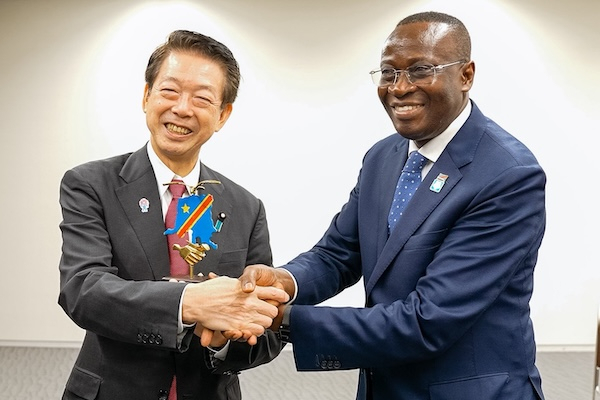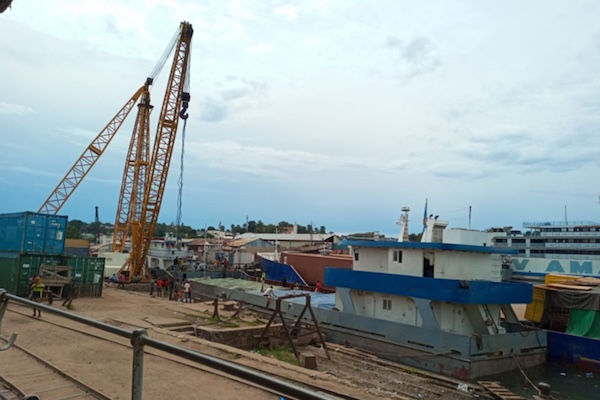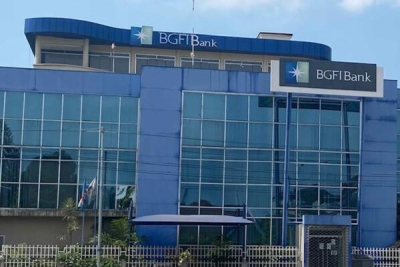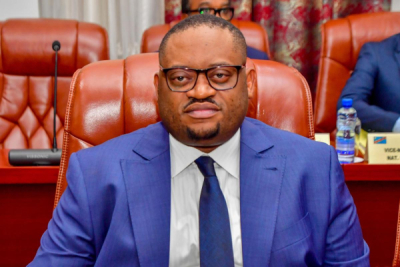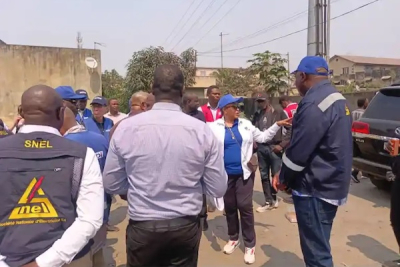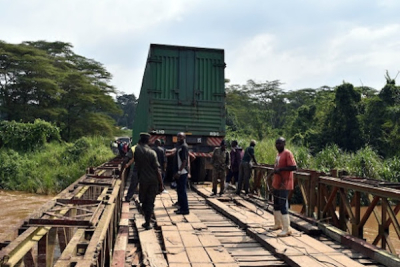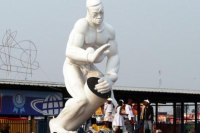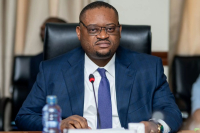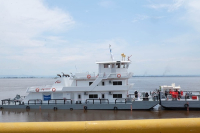
News (638)
The Democratic Republic of Congo (DRC) has been officially removed from Japan's list of countries ineligible for credit, a key step in strengthening economic cooperation between Kinshasa and Tokyo.
The decision was made on the sidelines of the ninth Tokyo International Conference on African Development (TICAD9) in Yokohama, Japan. During a meeting with Japan's Minister of Economy, Trade, and Industry, Yōji Mutō, DRC's Deputy Prime Minister and Minister of National Economy Daniel Mukoko Samba praised the development, stating that it opens the door to larger Japanese financing.
"We have been on this list for a very long time. But thanks to partial debt relief, improved economic conditions, and maintaining the electoral cycle, all the guarantees have been given," Mukoko Samba said. "Today, economic cooperation is no longer limited to modest amounts of development aid but is open to major projects."
Beyond access to concessional loans, Kinshasa and Tokyo have agreed to begin negotiations for an investment promotion and protection agreement. The two parties also discussed energy cooperation and opportunities for sustainable economic projects.
Mukoko Samba noted that while a few Japanese startups are already present in the country, the absence of major corporations remains a gap to be filled. He said the DRC’s removal from the ineligible list is a strong signal to encourage their return and support structural projects in energy, infrastructure, and other strategic sectors.
Japan, which has a history of involvement in the DRC through iconic achievements such as the OEBK Bridge in Matadi and the Congo-Japan Boulevard in Kinshasa, could now strengthen its economic footprint with new investments.
Boaz Kabeya
Key highlights:
• $70m first phase launched for Kalemie’s new industrial port.
• Project led by Jintai Mining–Tembo Majengo consortium on a 40-hectare site.
• Port to handle 2 million tonnes of goods annually, boosting DRC–Tanzania trade.
Preparatory work has begun on the future industrial port of Kalemie. This initial phase is valued at $70 million and is set to bolster trade between the Democratic Republic of Congo (DRC) and Tanzania.
The consortium Jintai Mining PTE Ltd and Tembo Majengo Company SARL, which signed its contract with Kinshasa in April, has started setting up a base camp on a 40-hectare site in Mutowa, about 30 kilometers from Kalemie. The camp will host staff and equipment for the works.
The first phase is slated for completion by end-2026. A second phase will expand capacity to 2 million tonnes of goods per year, strengthening the provincial economy and positioning Kalemie as a hub on the Central Corridor linking the DRC to Tanzania.
On August 15, Tanganyika Governor Christian Kitungwa, joined by a Transport Ministry delegation, inspected the site. He pledged close monitoring to ensure smooth progress. “All the necessary steps have been taken. Daily follow-up will continue until delivery,” he said.
The project forms part of Tanganyika’s multimodal development strategy and also includes oil terminals, shopping centers and related infrastructure, according to the governor’s office.
Kalemie’s port on Lake Tanganyika connects the DRC to Bujumbura in Burundi, Mpulungu in Zambia and Kigoma in Tanzania. According to official data, annual imports stood at about 60,000 tonnes in 2021, compared with 2,400 tonnes of coltan exports.
Ronsard Luabeya
Key highlights:
• Move unblocks long-delayed projects, including airports, stadiums and roads.
• Companies urged to open BGFI accounts before work starts.
BGFIBank RDC will serve as the guarantor for Congolese companies contracted under the Sino-Congolese infrastructure program. The latter has been delayed for over a year. The news was disclosed on August 21, during a meeting between the Agence de pilotage, de coordination et de suivi des conventions de collaboration (APCSC) and the contractors.
The contractors, seven local firms, signed in June 2024. Since then, the work has not begun, due to the absence of advance guarantees demanded by Société d’infrastructures sino-congolaise (SISC SA), which oversees projects financed by Sino-Congolaise des Mines (Sicomines).
All contracts are worth $150 million. They stem from the fifth amendment of March 2024, under which Sicomines committed to pay $324 million annually for Congolese infrastructure until 2040, as long as copper prices stay above $8,000 per tonne.
Jean-Benoît Adimashi Okito, Managing Director of Adi Construct and spokesman for the subcontractors, welcomed BGFI’s intervention: “We want to take advantage of the short dry season to get things moving,” he said.
To operationalize the guarantees, the companies have been invited to open accounts with BGFI Bank. Forms have been distributed, though the bank has not yet disclosed its conditions. The step follows a July 23 meeting that examined financing obstacles, work start-ups and performance expectations.
The beneficiary companies — including Adi Construct, Horizon Corporation, Hawa Limited, 2K Service, Mirage Construct, Mont Gabaon and Léopards Construct — are tasked with projects across the country. These range from university buildings and stadiums in Mbandaka, Kananga and Bunia, to the modernization of airports in Tshikapa and Lodja, and the rehabilitation of major roads such as the RN25 in Haut-Uele.
The Sino-Congolese program, first signed in 2008 and often called the “contract of the century,” is built on a resource-for-infrastructure model: mining concessions exchanged for public works. APCSC oversees the deal’s implementation, while the Agence congolaise des grands travaux (ACGT) monitors quality and compliance on sites.
Ronsard Luabeya
The Democratic Republic of Congo's Council of Ministers officially authorized the government to prepare its first-ever Eurobond issuance, Minister of Finance Doudou Fwamba Likunde announced on August 22, 2025. The $1.5 billion loan is expected to be launched before June 30, 2026.
According to an official statement published on LinkedIn, the funds raised will be dedicated to "financing priority infrastructure and improving national connectivity, in line with the Government Action Program for 2024-2028."
The initiative comes as the DRC shows relative macroeconomic stability, with inflation at 7.8% year-on-year, and a contained depreciation of the Congolese franc at 1.1% since December 2024. Economic growth is estimated at 5.3% in 2025. The country holds speculative sovereign ratings (B- by S&P and B3 by Moody's), but with stable outlooks. Its public debt remains relatively low at around 22.5% of GDP, providing additional borrowing capacity.
The Ministry of Finance has yet to release a precise timeline for the operation, but it is not certain to take place in 2025. The use of international markets was not included in the 2025 finance law, its June amendment, or the most recent IMF report related to the ongoing Extended Credit Facility program. The financial groups that will be mandated to arrange the operation are also yet to be announced.
Citi, which ranked first for debt arrangements in sub-Saharan Africa in the first half of 2025 according to a Reuters ranking, is a potential candidate to lead the operation, especially given its subsidiary in the DRC and the country’s joint actions with the United States to bring lasting peace to its eastern region. South African group Standard Bank, which is in the top 10 of regional debt arrangers and also has a subsidiary in Kinshasa, could be involved.
The interest rate at which Kinshasa will borrow remains a significant unknown. Investors will likely look for comparisons with companies operating in the DRC, such as Ivanhoe Mines, which secured a $750 million five-year loan at an annual interest rate of 7.87% in late January 2025. While a sovereign borrower generally receives more favorable terms, the risk premium imposed on Congo could bring its rate closer to that figure, particularly given the uncertain security and fiscal context.
A successful operation would strengthen the DRC's financial credibility and expand its access to international markets beyond the support of the IMF and the World Bank. However, an overly expensive issuance could weigh on the budget for years and weaken the macroeconomic trajectory, which is already under security and social pressures.
Idriss Linge
The Democratic Republic of Congo's national electricity company, SNEL SA, is moving forward with a $46.4 million project to modernize the power grid in northern Kinshasa. The project, which is scheduled to be completed by the end of 2026, will take 16 months to finish.
SNEL SA's Deputy General Director, Bienvenue Munyango, confirmed the details during a site visit on August 16, 2025. The work, contracted to China's CHINT Electric under an agreement signed on April 24, aims to rehabilitate the aging networks in the communes of Barumbu, Gombe, Kasa-Vubu, Kinshasa, and Lingwala.
During the visit, CHINT Electric announced the import of more than 300 containers of equipment, including power transformers of up to 130 MVA, medium and low voltage cells, high-capacity cables, and 25,000 smart prepayment meters. These meters will allow customers to transition to billing based on actual consumption, a key step in SNEL's digitization of services and revenue management.
The project also includes the installation of a 100/130 MVA 220/20 kV transformer at the Utexco high-voltage station, the laying of 67 km of new 30 kV links between substations, a full modernization of the Sendwe, Ndolo, and VDP stations, and the rehabilitation of 204 existing electrical cabins.
This project is a component of the PEGASE project, which secured a $135 million loan from the African Development Bank (AfDB) in 2017. Its implementation has faced delays, however, due to slow procurement procedures, according to a January 2024 evaluation report.
According to SNEL General Director Fabrice Lusinde, the company will gradually extend modernization efforts to all of Kinshasa. In support of this broader goal, SNEL has secured a $27 million non-reimbursable grant from the Japan International Cooperation Agency (JICA). The agreement, signed on May 4, 2025, between Minister of Foreign Affairs Thérèse Kayikwamba Wagner and Japan's Ambassador Ogawa Hidetoshi, will specifically support the rehabilitation of networks in the communes of Limete, Lemba, Matete, Ngaba, and Kisenso.
Timothée Manoke (Intern)
-
Bridge closed due to advanced deterioration
-
Emergency rehabilitation announced; a new reinforced concrete bridge will replace the old structure.
-
Local communities fear produce shortages and losses for traders and transporters.
Due to the advanced deterioration of the Lovoy bridge, located between Lueji and Lunge on national road n°1, traffic between Lubumbashi and Kamina has been halted for several days. Consequently, the local civil society worries over possible shortages of produce in Kamina’s markets.
Official sources report that the bridge, originally designed for small loads, has faced years of heavy traffic from trucks, causing progressive subsidence and making it dangerous or impassable.
In response, Haut-Lomami provincial infrastructure minister Venance Mutombo ordered the immediate suspension of traffic and announced rehabilitation work. The project involves the construction of a new reinforced concrete bridge to replace the current metal structure. No precise timetable has been given for the work.
Meanwhile, trucks remain blocked on both sides of the bridge, located about 20 kilometers from Kamina. Goods are at risk of deterioration and losses for traders and transporters, and drivers and travelers are forced to spend nights outdoors due to the absence of nearby accommodation facilities.
Boaz Kabeya
-
Project will be developed in Kolwezi
-
It includes five bridges, 3.5 km of roads and 240 solar-powered street lamps.
-
Forrest Group will handle construction and lighting works
The province of Lualaba is set to begin construction of the Democratic Republic of Congo’s first double road interchange in Kolwezi, the provincial capital and main mining hub. Work is scheduled to start in 2025.
Two subsidiaries of the Forrest Group will carry out the project: Malta Forrest, responsible for design and construction, and Congo Energy, handling solar-powered street lighting.
The interchange will be located at the Mwangeji traffic circle, where avenues Lumumba, LDK, Mandradele and RN39 intersect — a key junction in the city. The project is aimed at easing traffic congestion in Kolwezi, one of Congo’s fastest-growing cities. It includes the construction of five bridges, several slip roads, nearly 3.5 kilometers of roads, and the installation of 240 solar street lamps along ramps, bridges and access roads.
The cost has not yet been disclosed, and few details are available on the exact terms of collaboration between Lualaba and the Forrest Group. The company previously built Kolwezi’s first interchange, inaugurated in June 2025 near the airport by President Félix Tshisekedi. The governor of Lualaba has indicated that such infrastructure is part of the province’s 2024–2028 priority investment program under its “transport infrastructure” component.
Founded in 1922, the Forrest Group is a Belgian-origin industrial conglomerate historically established in the DRC. It remains one of the main private, family-owned players in the country and plays a central role in transport infrastructure and mining services — two critical sectors for Congo’s economy.
Ronsard Luabeya
-
Matadi and Muanda set to house the new buildings
-
Chinese company CCECC inspects sites as part of project preparations.
-
Provinces across the DRC are allocating land to host fairs, exhibitions, and economic events.
As part of efforts to revive trade fairs in the Democratic Republic of Congo (DRC), new modern infrastructures are planned in Matadi and Muanda, in Kongo Central province.
On August 19, 2025, a delegation from the Chinese company Chongqing Civil Engineering Construction Cooperation (CCECC) visited the sites. The mission, led by the provincial Minister of Tourism and representatives of the Foire Internationale du Congo-Kinshasa (FICKIN), was welcomed by Vice-Governor Prospère Ntela Ntambidila.
According to the governorate's communication unit, discussions focused on project presentations, feasibility studies, and the monitoring of administrative and land procedures. The director of the provincial fair, Hypollite Mukunde, said the vice-governor had provided recommendations to accelerate the process, aiming to boost the tourist and commercial appeal of Kongo Central.
This initiative aligns with the strategy of the Ministry of Foreign Trade, which asked provinces to set aside land for fairground infrastructures. Kongo Central has allocated 50 hectares, split between Matadi and Muanda.
Other provinces are also contributing: Maniema with 100 hectares, Lualaba with 50 hectares, while Tshopo is still finalizing its allocation. These areas will host fairs, exhibitions, and other economic events to showcase local and regional potential.
Ronsard Luabeya
-
The Strategic Investment Fund (FIS-RDC) is the name of the new entity
-
It covers primarily infrastructure, energy, agriculture, technology, among others
-
Two other state financial institutions are also in the works
The Congolese government has approved the creation of the Strategic Investment Fund of the Democratic Republic of Congo (FIS-RDC). The draft decree, presented by Finance Minister Doudou Fwamba at the Council of Ministers on August 15, 2025, marks a major step toward setting up a long-discussed sovereign wealth fund.
Several steps still lie ahead — the appointment of directors, operational arrangements and the official launch — and no timeline has yet been announced. But the government has outlined its ambitions clearly.
According to the Council minutes, the FIS-RDC will be tasked with mobilizing and structuring financing to speed up the national development strategy. Its mission also includes boosting territorial inclusion, diversifying the economy and reinforcing national sovereignty.
To do so, the fund will turn to modern financing tools that go beyond traditional loans and grants. It will be allowed to invest in strategic areas ranging from infrastructure, energy and technology to agriculture, real estate and industry. The FIS-RDC will also be charged with managing state assets and forging partnerships with private and institutional investors, both domestic and foreign. All operations, the government stressed, must follow strict transparency, environmental and social standards.
This new fund is part of a wider effort to reshape Congo’s financial architecture. In July, the government also unveiled plans for a Caisse des Dépôts et Consignations (CDC) and a Banque de Développement, a future CDC subsidiary with $150 million in capital. The bank is expected to channel long-term financing into priority projects, reducing dependence on external borrowing and strengthening the country’s financial resilience.
Boaz Kabeya
-
Fuel supply to CAR discussed between Congolese and Central African ministers.
-
Electoral operations expected to increase consumption, while current stock levels are deemed insufficient.
-
Kinshasa requested to support logistics, especially river transport via SEP Congo.
The Central African Minister for Energy Development and Hydraulic Resources, Arthur Bertrand Piri, visited Kinshasa on August 19, 2025, to meet his Congolese counterpart, Acacias Bandubula. Discussions focused on the supply of petroleum products to the Central African Republic (CAR).
Minister Piri highlighted that several upcoming elections would drive an increase in fuel consumption. In addition to regular needs, electoral operations—including deployment of equipment, logistics, and security—would add to demand. Current stock levels were described as “insignificant” by Central African authorities.
"Usually, from June onwards, the barges start to go up. But this year, real rains only started at the end of July. So it wasn't until the beginning of August that we began the upturns, timidly. This put us two months behind schedule, which affected the national stock," explained Minister Piri.
About 80% of CAR’s official fuel consumption passes through the DRC and is transported by river, a route roughly half the cost of road transport. However, this corridor is available only from July to December each year.
To address this logistical gap, Bangui requested support from Kinshasa, particularly for operational coordination. SEP Congo (Services des entreprises pétrolières congolaises) manages unloading tankers at the port of Ango-Ango in Matadi, transfers fuel by pipeline to Kinshasa, and transports it by river to CAR.
On the same day, the Congolese Minister of Hydrocarbons met with the professional committee of petroleum product importers to examine the situation. He issued instructions to facilitate the transit of petroleum products destined for CAR.
Ronsard Luabeya
More...
-
Project first announced in August 2024
-
Project includes terminal building, control tower, new 2,200-metre runway, and technical facilities.
-
Flights will be temporarily redirected to Tshiumbe airfield during construction.
After more than a year of anticipation, modernization work at Lodja airport in Sankuru province is finally set to begin. The announcement was made on August 14, 2024, by Eddy Shungu, Provincial Director of the Congolese Agency for Major Works (ACGT), during the reception of the first shipment of equipment for the site.
The initial delivery included drums of fuel, bags of cement, and a loader shovel, with other equipment for the development of Lumumba-ville also received. A second batch is already stored in Bena Dibele and Kinshasa, ready for future rotations, while the remainder will arrive progressively as the project advances.
The modernization project, officially launched in December 2023, is being carried out by the Congolese company Adi Construct under the Sino-Congolese cooperation program. Its duration is estimated at two years, though investment figures have not been disclosed.
Plans include a new terminal building, control tower, and a runway extended from 1,600 to 2,200 metres and widened to 30 metres, paved with hydraulic concrete. Access ramps and a technical block will also be constructed, allowing the airport to accommodate wide-body aircraft, including Airbus A320s. During construction, flights will be rerouted to Tshiumbe, the third-largest town in the province.
Supervision will be provided by the ACGT, in collaboration with the Agence de pilotage, de coordination et de suivi des conventions entre la RDC et ses partenaires privés.
This modernization aims to open up Sankuru province, improving trade and mobility between Lodja and major cities such as Kinshasa, Mbuji-Mayi, Goma, Bukavu, and Kisangani.
Ronsard Luabeya
-
Net Profits in H1 stands at 9.1 billion KES (71.4 million USD).
-
The Congolese subsidiary now the second-largest contributor to Equity Group earnings.
-
Loan portfolio rises 13% to 275.4 billion KES (2.16 billion USD); shareholder equity grows 28% to 82.6 billion KES (648 million USD).
Equity BCDC, the Congolese subsidiary of Kenya-based Equity Group Holdings, recorded a net profit of 9.1 billion Kenyan shillings (71.4 million USD) in the first half of 2025, a 22% increase over the same period in 2024.
The figures highlight the strength of Equity BCDC, now the second-largest contributor to Group earnings after Equity Bank Kenya, accounting for 26.3% of total profits (34.6 billion KES). The Kenyan subsidiary remains the largest contributor at 56.4%, while other regional units and the insurance arm showed mixed results.
Equity BCDC continues to expand its lending operations, with a portfolio rising 13% to 275.4 billion KES (2.16 billion USD), making it the largest regional subsidiary in loan volume, representing 33.4% of the Group’s total.
The Congolese subsidiary is also strengthening its financial stability. Shareholders’ equity increased 28% to 82.6 billion KES (648 million USD), reinforcing confidence despite occasional internal social tensions in the DRC.
Timothée Manoke (intern)
Read Also:
Equity BCDC: Unions decry a "disguised layoff" targeting 460 agents.
Equity bets on DRC for growth, despite regulatory constraints.
Insurance in DRC: Equity targets a market with great potential.
Highlights:
• Kinshasa and Brasília sign multiple agreements covering visas, diplomatic work, and military cooperation.
• Collaboration expands to agriculture, health, environment, and electoral projects.
• Trade reached a record $259 million in 2024, up 28% from the previous year.
The Democratic Republic of the Congo (DRC) and Brazil signed several agreements and memorandums of understanding on August 11, reinforcing diplomatic, security and economic cooperation, the DRC government said.
The agreements include visa exemptions for holders of special passports and authorization for paid work for diplomats’ dependents. In the security sector, both countries pledged to strengthen the operational capabilities of the DRC Armed Forces (FARDC), acquire equipment, exchange expertise in the military industry, and train special jungle units.
“The signing of these agreements testifies to the shared desire of the two States to consolidate their diplomatic relations in the service of the well-being of their peoples,” the DRC Ministry of Foreign Affairs said on X.
The countries also collaborate on strategic sectors including agriculture, health, biofuels, environment, and elections. A technical cooperation program launched in 2022 trains small-scale Congolese agricultural producers.
Trade between the two nations hit a record $259 million in 2024, up 28% against 2023. Last year, Brazil exported $191.5 million worth of sugar, poultry, and pork to the DRC while the Central African nation exported crude oil valued at $67.6 million. In 2023, Félix Tshisekedi became the first Congolese president to pay an official visit to Brazil.
Lydie Mobio
Highlights:
• Tax breaks for mining, oil and industry cost over 3% of GDP in 2023
• Exemptions absorb 75% of lost revenue, but jobs grew just 3% in 2024
• World Bank urges targeted incentives, more transparency and efficiency
The Democratic Republic of Congo (DRC) grants significant tax exemptions to the mining, oil and industrial sectors, but their impact on employment remains limited, according to the World Bank’s report “Reassessing Tax Incentives – Far from the Promised Growth and Equity” published at the end of July 2025.
The report estimates that tax expenditures, mainly from corporate income tax (CIT) and value-added tax (VAT) exemptions, accounted for over 75% of lost public revenue. In 2023, they represented 1.6% of GDP for the mining sector, 1.5% for oil and 0.7% for industry. By contrast, employment grew only 3% in 2024, with the labor market still dominated by informality and insecurity.
Although the DRC’s corporate tax rate of 30% is above the African average of 28%, the country offers temporary exemptions of three to five years in certain economic zones, coupled with customs and tax benefits. But the World Bank warns that these schemes are “often poorly targeted and profit-based,” distorting investment choices and even encouraging companies to delay projects until exemption periods expire.
Instead, the institution recommends replacing broad exemptions with targeted measures such as accelerated depreciation, while broadening the tax base and ensuring greater transparency. It further calls for rationalizing tax expenditure, harmonizing rates and strengthening budget analysis to enhance efficiency, equity and domestic revenue mobilization.
Ronsard Luabeya






